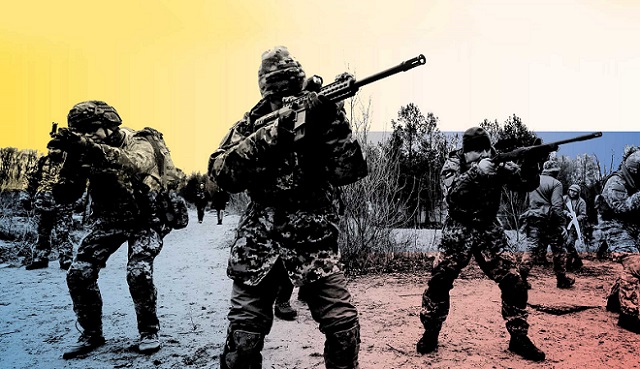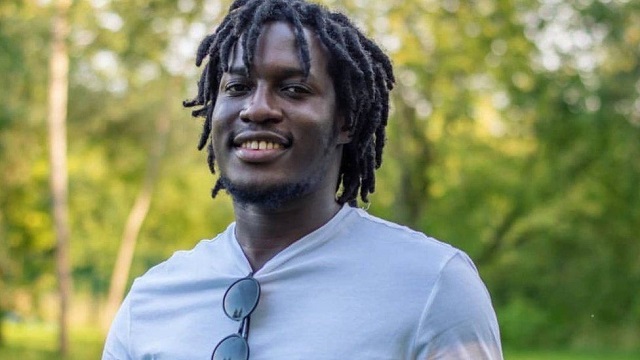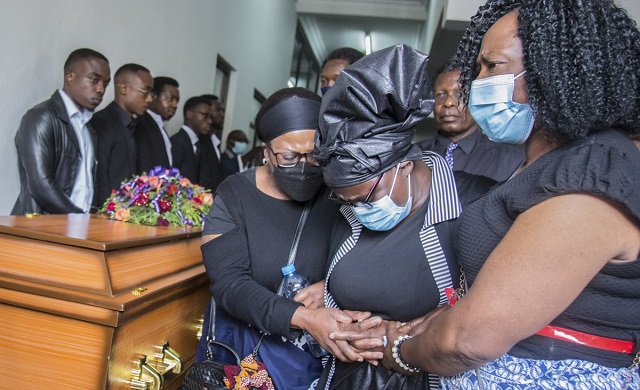
Used as cannon fodder by Russia Wagner mercenaries
COVER STORY | AGENCIES | Hundreds wailed as the body of a 33-year-old Tanzanian man, Nemes Tarimo, who was killed fighting in Ukraine as part of Russian President Vladimir Putin’s `Shadow Army’; the Wagner Group mercenaries, was on Jan. 24 returned home for burial.
Tarimo’s terrible death reportedly occurred in December 2022 but news of it spread after a video surfaced around mid-January 2023 showing a casket said to contain his body surrounded by men said to be Russians. In the video, the men holding candles place two medals and a certificate on the casket bearing the flag of the Wagner Group.
Tanzania officials said Tarimo reportedly agreed to fight for the Wagner Group in exchange for being released from a Russian prison where he was being held following a drug-related crime conviction.
Tarimo’s case was the second widely publicised case of an African known to have died while fighting under the Wagner flag for Russia on the frontlines of Ukraine. The first was that of 23-year old Lemekhani Nyirenda, a Zambian national.
Nyirenda was also a student in Russia, at the Moscow Engineering Physics Institute, was serving nine years in jail for a drug offence, and was sprung out of jail be Wagner on the promise that he walk free if he fought for the group. He was killed in September 2022 but Russia confirmed his death in January.
“We don’t know who conscripted my son from prison,” said his father Edwin Nyirenda to Reuters news agency. But videos have circulated on social media showing Wagner founder and boss, Yevgeny Prigozhin, recruiting fighters from Russian jails. The video shows many decide within minutes and possibly with limited information and a heavy dose of frustration.
Media wars
Some of the reporting on African soldiers on Ukrainian battlefields reflects the tussle in the media covering Wagner’s role in the Ukraine war.
“The Wagner Group is desperately seeking new cannon fodder to fight in Ukraine, and has started raiding the prisons of the Central African Republic (CAR) for recruits, according to local sources.
The Russian private military company (PMC) is releasing prisoners in the CAR and sending them to Donbas, Ukraine, The Daily Beast reported in late November, citing local military officials.
Men incarcerated for crimes including rape and murder are being released en masse to join Wagner’s forces, they said.
The PMC’s Central African “wing” has hundreds of fighters, known insultingly as “Black Russians”, according to the officials.”
That reporting is from a report on a website called Caravaserai which is sponsored by the United States Ministry of Defence’s Central Command (USCENTCOM). Its Area of Responsibility (AOR) includes the Middle East, including Egypt in Africa, and Central Asia and parts of South Asia.
On Feb.01 CNN reported: The Wagner way of war is to send a first wave of attackers that mainly comprises raw recruits straight out of Russian prisons. They know little of military tactics and are poorly equipped. Most just hope that if they survive their six-month contract they can go home rather than back to a cell.
The story quoted a Ukrainian soldier saying for several weeks they confronted hundreds of fighters belonging to Wagner “throwing themselves against Ukrainian defenses”.
“They’re climbing above the corpse of their friends, stepping on them,” he said, ““It looks like it is very, very likely that they are getting some drugs before attack.”
Several Ukrainian soldiers in Bakhmut reportedly told AFP these alleged ex-convicts are used as a type of “human bait”.
“It starts at around 6.00pm, when it’s getting dark,” said Anton, a 50-year-old Ukrainian soldier from the 93th brigade who was resting after an injury.
“These soldiers — with no experience — are sent towards our guns and stay there for a few minutes,” said Anton, estimating that seven or eight were sent every night.
“Their job is to advance towards us, forcing us to fire on them, to reveal our positions,” said Sergiy, a major in the 53rd brigade.
“After that, they fire artillery or send more experienced commandos towards our positions.”
Most of these fighters — dubbed “disposable soldiers” by the Ukrainians — are killed, they said. Some are wounded and captured.
The change in tactics has surprised Ukrainian forces. Wagner mercenaries were previously known for being better trained and equipped than regular Russian forces.

“It’s a widespread phenomenon for Wagnerites to simply walk into bullets and die,” said Irina Rybakova, a spokeswoman with the 93rd brigade, using a term for members of the group.
“I think they are on something. Our guys said that they are under the influence of drugs of some sort,” she told Caravanserai.
Reports indicate that the Wagner Group started actively recruiting inmates at Russian prisons in June 2022, preferring hardened criminals who are prone to violence.
Kidnapped fighters
In some cases, the Wagner Group kidnaps rather than recruit inside prisons.
At the end of October, Marfa Smirnova, a journalist for Dozhd TV, reported that Wagner personnel came to a Saratov prison, took inmate Sergey Serbezov, a Ukrainian citizen, and “forced (him) into a helicopter and sent (him) to the front”.
“Later, Serbezov was shot while trying to escape, at least by Wagner’s account. His widow received a text message asking her for $1,000 in exchange for her husband’s body,” Smirnova’s report said.
According to a story in the Daily Beast, an American news website focused on politics, the Wagner Group is doing the same in Africa.
The Daily Beast story reportedly spoke to two escapees from Wagner, Ali and Hassan who have had Wagner abduct their relatives in reprisal for their going AWOL.
Ali narrated how the Wagner enforcers from the Black Russians arrived at his house in the middle of the night.
“They looked straight into my eyes and said, ‘If you don’t come back to us, you and your family will be killed,’” Ali, who had spent close to a year working closely with the Wagner Group, told The Daily Beast. “They left without saying anything else.”
Minutes later, the armed men allegedly stormed the nearby home of Hassan and issued him a similar warning, but with a more severe punishment for allegedly masterminding the exit of several Black Russians from the Wagner Group.
“They said if I don’t return to the (Black Russians) group they’ll seize me and my family and torture us for days before they eventually kill us,” Hassan, a former Black Russian, told The Daily Beast. “They believe I have been the one encouraging other members to leave the group because I was among the first to quit.”
The Wagner Group, which showed up in the war-torn Central African Republic around 2018, has relied heavily on local recruits since last year, after hundreds of its Russian mercenaries were pulled from Central Africa and sent to Ukraine to fight Vladimir Putin’s war.
But poor welfare for Black Russians—and fear that they could be deployed to fight overseas without compensation or insurance—has forced many to abandon the group.
When Ali and Hassan, not their real names, refused to rejoin the Black Russians, Hassan’s two sons, who are 15 and 13 years old, were kidnapped. The Black Russians vowed not to release them until their father returns to the Wagner unit to “face discipline”. Hassan and his mother, who was the only one at home with the boys when they were taken away, fled to Cameroon.
Ali’s three younger brothers, who are 27, 24, and 23 years old, were also kidnapped the same day. No one has seen them since then, according to family members who believe the Wagner Group is responsible for their disappearances.
“The main reason some of us left the [Black Russians] group is because we feared they could send us to war in Ukraine without giving us the chance to inform our families,” said Ali. He says he had been in touch with some of his colleagues deployed to Ukraine in the early months of Russia’s invasion and allegedly abandoned thereafter.
“If we die on the battlefield, no one would know anything about it.”
Ali and Hassan believe the Wagner Group’s decision to not reveal the whereabouts of Black Russians deployed to Ukraine’s Donbas region is based on financial reasoning.
“They don’t want to pay the death benefit they promised they will pay to families of fighters who died while in active service,” said Hassan. “If families don’t know their sons are fighting in Ukraine, they won’t also know when they are killed in combat and can’t demand death benefit as a result.”
Disrupting force
Before the war in Ukraine, Wagner boss Yevgeny Prigozhin was probably best known in the United States for funding the Internet Research Agency (IRA); the infamous St. Petersburg “troll farm” accused by U.S. authorities of spreading online misinformation in the U.S. on the Kremlin’s behalf ahead of the 2016 presidential election. Prigozhin was in 2019 sanctioned by the U.S. Treasury Department for his ties to the operation.

He made his money through a catering company that won many lucrative government contracts to feed Russian school kids, prisoners and soldiers and Presidential events. He became Putin’s close friend and ally and earned the moniker of `Putin’s chef” because he ran a swanky waterfront spot in St. Petersburg called New Island. This became a favorite of Putin’s for entertaining visiting dignitaries, including U.S. President George W. Bush, whom Prigozhin personally served at a 2006 dinner.
Yevgeny Prigozhin in September disclosed for the first time that he founded the Wagner Group in 2014 to fight in Ukraine and acknowledged its presence in Africa, the Middle East and Latin America. Wagner had already been accused of meddling in conflicts in Mali, Libya, Chad, the CAR, Sudan and Mozambique on the African continent and in Syria, Venezuela and Ukraine.
But Prigozhin’s admission came after he and the Kremlin had long denied the group existed. Serving as a mercenary remains illegal for Russians.
Wagner is destabilising almost all of the Sahel, a region that comprises most of western and north-central Africa, from Senegal to Sudan. They have been implicated in human rights abuses and illegal natural resource exploitation in Mali and the Central Africa Republic (CAR).
Wagner appears to have singularly ensured that sub-Saharan Africa becomes the world’s terrorism haven. According to the 2022 Global Terrorism Index, 48 percent of all terrorism deaths worldwide occurred in the Sahel; with Burkina Faso, Mali, and Niger among the top 10 countries where terrorism-related deaths have increased. Wagner’s presence and activities in the region have been linked to military coups in Mali, Burkina Faso, and Chad and opened security gaps for jihadi groups such as Islamic State and al Qaeda affiliates to occupy on the back of reduction and relocation of U.S. and French troops from the Sahel.
Faced with increasing acts of terrorism, banditry, looting, robberies and kidnappings, countries in West Africa have embraced the `protection’ services of Wagner mercenaries. They see the Wagner Group as an effective fighting force to counter the terrorists and criminals.
For the Africans, Wagner Group has become a symbol of a force that is strong enough to be a sufficient weapon in asymmetrical war against terrorists on the continent. People call upon their governments to make a deal with the Russian PMCs.
According to reports, this has led to sights of people on the streets of Burkina Faso, Gabon, Central African Republic, Guinea and Mali wearing T-shirts with “Je suis Wagner” (I am Wagner) prints and cars decorated with words of support for the Russian PMC: “Je soutiens les soldats Wagner” (I support Wagner soldiers) and “Je suis pour Wagner” (I support Wagner).
According to the story in the Daily Beast, Wagner been recruiting fighters outside of Russia. It, for example, transports fighters it previously recruited in the war-torn Central African Republic around 2018 to fight for Russia.
Numbers unknown
Wagner has also been accused of recruiting and kidnaping Africans in a so-called “Black Russians” army to fight in the Donbas region.
It says three years ago, Ali and Hassan joined the Union for Peace (UPC), a Central African rebel group fighting for control of an area located at the border between the mainly Muslim north and the predominantly Christian south. Their involvement with the UPC, whose leader Ali Darassa was sanctioned over a year ago by the U.S. Department of the Treasury’s Office of Foreign Assets Control (OFAC) “for serious human rights abuses”, lasted only a few months. It was cut short by an enticing offer from Wagner Group.
Ali and Hassan were among hundreds of UPC rebels who surrendered to the CAR military in December 2021 after both men said they were promised a chance to work with the Wagner Group and earn a monthly pay of about $1,000.
But when Wagner stopped paying some Black Russians after a few months, and many local recruits mysteriously disappeared towards the end of 2022, both Ali and Hassan decided to leave the group and move away from their base in the capital Bangui to Berbérati. Their Daily Beast story implies that those who refuse to be shipped to Russia and go AWOL are hunted and “punished”.
Accurate figures of Africans killed while fighting on the frontlines in Ukraine are not easily available. But a report by British Broadcaster BBC as far back as June 2022 quoted the Russian Ministry of Defence saying at least 42 African soldiers had been killed in Ukraine; thirty-eight of them were believed to be Nigerian and four of them Senegalese. Russia said the African soldiers were fighting on the Ukrainian side.
But Russia has a target of at least 50,000 convicts to recruit and the Wagner boss, who is an ex-convict himself, has already sent more than 3,000 inmates to Ukraine, according to Berlin-based Olga Romanova, director of Russia Behind Bars; a human rights organisation, who spoke to the The Daily Beast.
“They benefit from hiring prisoners, because many of these recruits die on the battlefield and they generally have no ties with relatives, and … Wagner does not pay the wages of those who are killed,” she said.
Accepting responsibility for African soldiers dying on battlefields in Ukraine has proved to be a tough tussle between the Russian and Ukraine governments. Each denies responsibility.
“We call on African Union and all African states to demand that Russia stop press-ganging their nationals,” Ukrainian Foreign Ministry spokesman Oleg Nikolenko wrote on social media, “Africans shouldn’t die for Putin’s sick imperial ambitions.”
 The Independent Uganda: You get the Truth we Pay the Price
The Independent Uganda: You get the Truth we Pay the Price





